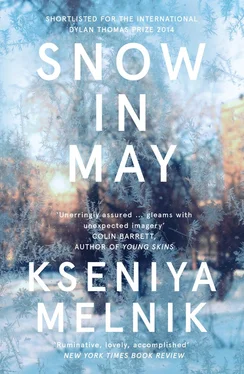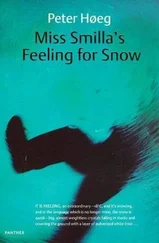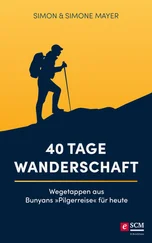The last time I heard from Tolyan was by phone in ’92, shortly before I moved to America. His second wife had sobered him up, and they tried to launch a business importing knockoff brand clothing from Poland. Tolyan refused to cooperate with the local mafia for his “protection” and was beaten up. The business folded. Brutal age, rough manners , indeed. On top of that, he got into a car accident and couldn’t walk for a year.
I was surprised at how adamantly he interrogated me on the subject of tennis. Did I still play? At our old courts in the Park of Culture and Leisure or at the Palace of Sport? How often and with whom? Since my daughter’s birth, tennis wasn’t my tenth or hundredth priority, I said, though not dismissively, in honor of our good memories on the court. This seemed to disappoint him gravely. Then he asked after his skis and we talked about the skiing accident. How young, strong, and healthy we were then, with our whole lives ahead of us. In fact, looking back over his life, Tolyan said, he didn’t know what it all had been for. He was a failure at work, at being a husband and a father.
“What about your new wife? Aren’t you at least a bit happy with her?” I asked.
“You’re going to laugh. I keep thinking about Anya.”
Anya, the one who got away and was caught in the memory like a fly in amber.
“You stupid old goat.”
“Have you heard anything about her?”
“No.” The lie jumped off my tongue instinctively. Anya was still in Magadan, with two daughters. The older one was Seryoga’s, although neither he nor the father of her younger daughter, Asya, were around. Asya and my daughter, Sonya, attended a ballroom dance studio in the same Palace of Prof-Unions where Tolyan and I used to go to dances. I had recently run into Anya at one of the ballroom competitions. She was heavyset, her hair faded, her eyes tired and wet. We talked for a few minutes, mostly about our children. Her older daughter was studying piano, she told me with pride. She didn’t ask about Tolyan.
I contemplated whether this information would make Tolyan feel better or worse. “Well,” he said, “at least it worked out for one of us. Imagine if you hadn’t broken your leg then?”
I could have told him that nothing was his fault or mine, that he was simply unlucky. I could have asked him whether there were any medications prescribed for all his bruises or anything else he couldn’t get in Voronezh that I could try to procure for him in America. I could have invited him for a visit. But something inside me turned cold and protective. I was wary of dragging so much bad luck into my new life, nervous about Tolyan’s dormant alcoholism, the possibility of his wanting to involve me in some dubious business scheme. A good-for-nothing childhood friend was better left in childhood.
We exchanged a few more reminiscences and hung up.
It was a beautiful afternoon in Southern California, and I decided to take Sputnik to his favorite beach. As I drove, Sputnik breathing fast into my ear, I continued to think about how luck is distributed among the living—a subject I’ve been ruminating on often lately. I began to understand why Tolyan might be so eager to get in touch with me. For him, the years when our paths ran parallel to each other were the peak of his life. I could only imagine to what legendary proportions our youthful friendship had grown by now in his imagination. For me, however, those years were a takeoff strip, not the flight.
While Tolyan and Lenka hit each other over the head with frying pans in Voronezh, I was living out a happy routine in Magadan. Work, home, grocery stores, day care (then kindergarten and school). Marina cut her thick, dark hair into a bob, which sat on her head like a thatched roof. Sonya was growing up healthy, beautiful, and ambitious. She shined at school, which in time would be converted into the English Lyceum, with an emphasis on learning English. She studied piano at the special section for gifted children at Marina’s college (the poor child was not allowed to quit) and pursued passionately a hundred other interests from basketball and ballroom dancing to theater, figure skating, and astronomy. She often talked about becoming a doctor, like her grandmother Olya. I could never get her to love tennis as much as I did, but she liked to ski. When I showed her the fateful spot where I had fallen and broken my leg—the accident that led me to her mother—she bent down and whispered “thank you” into the snow.
In the summers, we took Sonya to the Black Sea or sent her to her grandparents, Marina’s mother in Syktyvkar or my father in Ukraine. My mother died when Sonya was eight. Two years later my father met another woman and moved with her to a small village outside of Kiev called Milaya—“darling.” He now had a vegetable plot, a chicken coop, and a goat.
By the time Sonya was born, I was vice president of the Department of Commercial Transportation. Due to my youthful misadventures with the Young Pioneers, political reservations, and, in large part, lack of desire to invest time and effort, I’d never joined the Party and that made further promotion unlikely. I developed good relationships with the head of my department, Vasily Lavrentiev, and the vice president of the Aviation Administration, Afanasy Prokhorov. I could barter my access to distribution of airline tickets for favors and defitsit items. My hours were leisurely. I had plenty of time to spend with my daughter and to appease Marina in the kitchen by frying an occasional fish and potatoes.
In ’85, a new man from Moscow, Davydenko, was appointed president of the Aviation Administration and immediately set about getting rid of the old guard. He stirred up half-fictitious criminal cases against a slew of heads of various departments, accusing them of faulty accounting. In those days, the economy was mostly on paper; it was easy to find evidence of just about anything. Prokhorov and Lavrentiev were sentenced to two years of “work for the development of the national economy.” Prokhorov, a bear of a man, served out his term as a truck dispatcher, cramped all day in a tiny radio booth. Short and rotund Lavrentiev, on the other hand, was comically appropriate as a loader at the bakery, the same one from which Tolyan and I used to steal bread when we were boys. The town was outraged by the injustice, but we could do nothing.
In the end, the legal drama turned out for my benefit. When several of Davydenko’s men, having no prior experience in Magadan aviation, failed to handle the position of the commercial transportation VP, I was appointed to fill it.
In ’87, perestroika began in earnest. Food shortages started to occur even in Magadan. I stood in endless lines for meat, milk, and butter; then, just as my turn was coming up, I phoned Marina to bring Sonya to the store to show to the sales clerk. Three meat coupons, three family members accounted for. Marina got a mushroom haircut and highlighted her hair with ashen streaks. Prokhorov and Lavrentiev were acquitted and restored to their former positions—and I had to give my post back to Lavrentiev. There were no job openings, so Prokhorov created a nominal position for me: director of special programs. I had no official duties and absorbed the overflow. In my free time I studied English. In ’89 and ’90, a passage to America opened via none other than Alaska. The first charter flights were organized to Anchorage, Juneau, and Seattle. Children’s choirs and sports teams began exchange programs. Rotary and Lions Clubs and the Seventh-day Adventist Church descended on our backwater shores in a flurry of philanthropic and missionary activity. Americans wanted to invest in Magadan’s gold and fisheries, and see the ruins of the ill-famed Gulag.
In time, the agency developed an international aviation department, and I happened to be just the right man to head it. After I had translated one or two short documents (looking up every word in a dictionary), I was hailed as the resident English-language expert. And, as I wasn’t tied up in any other projects, I flew to Moscow to take a course in international aviation and then to Alaska to study the American side of the operation. For the first time in my career, the fact that I’d never belonged to the Party was beneficial; my work visa application was processed without a hitch. I think of my first encounter with America aromatically: the coffee and cinnamon of the hotel lobby, the lilacs of the bathrooms, the deodorant of people unadulterated by sweat. Though, I must say, even the bright, smiling America could not eclipse the impressions of youth—the cobblestone streets of Riga, the view through my paper window.
Читать дальше












